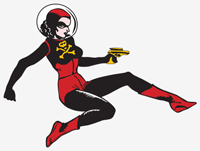
Professor Brian Attebery, who teaches English at Idaho State University and is editing Ursula K. Le Guin’s work for the Library of America, gave the closing keynote (full text now available at tor.com) at the James Tiptree Symposium last weekend.
Prof. Attebery proposed a “mitochondrial theory of literature” in which he drew direct lines from Nike Sulway’s story “The Karen Joy Fowler Book Club” (check it out! the characters are all rhinoceri!) not only to Karen Joy Fowler’s work but also to Jane Austen, James Tiptree, Jr. (and Alice B. Sheldon). From there he found paths to Connie Willis, Nancy Kress, Ursula K. Le Guin, and Donna Haraway. And the paths just keep branching outwards.
The whole speech is well worth reading, as Attebery surefootedly takes us down several literary, academic, and biological paths, concluding with:
I would propose that everyone here is part of the James Tiptree Jr. Book Club, which is also the Ursula K. Le Guin Book Club, the Karen Joy Fowler Book Club, and so on. We are a set of interlocking cells, what one male SF writer suspiciously termed the Secret Feminist Cabal.* This, unfortunately, is a time for resistance: for secret cells and mutual support and active intervention in literary culture and the broader culture. Whenever a group of readers takes in a new book, that book becomes part of the collective DNA and a powerhouse for the cell, the conspiracy, the cabal. That is part of what Karen Joy Fowler tells us in “What I Didn’t See” and Nike Sulway tells us in “The Karen Joy Fowler Book Club.” Whatever we call the process, whether mitochondria or allusion or something else like the Exhilaration of Influence, it can serve as a corollary to Russ’s work. It shows How Not to Suppress Women’s Writing.
One of the slogans of the Tiptree Award is “World Domination Through Bake Sales.” I suggest we add a corollary to that: “World Insurgency (and Mitochondrial Power) Through Book Clubs.”
* A phrase the Tiptree Award immediately pounced on and made our own.
